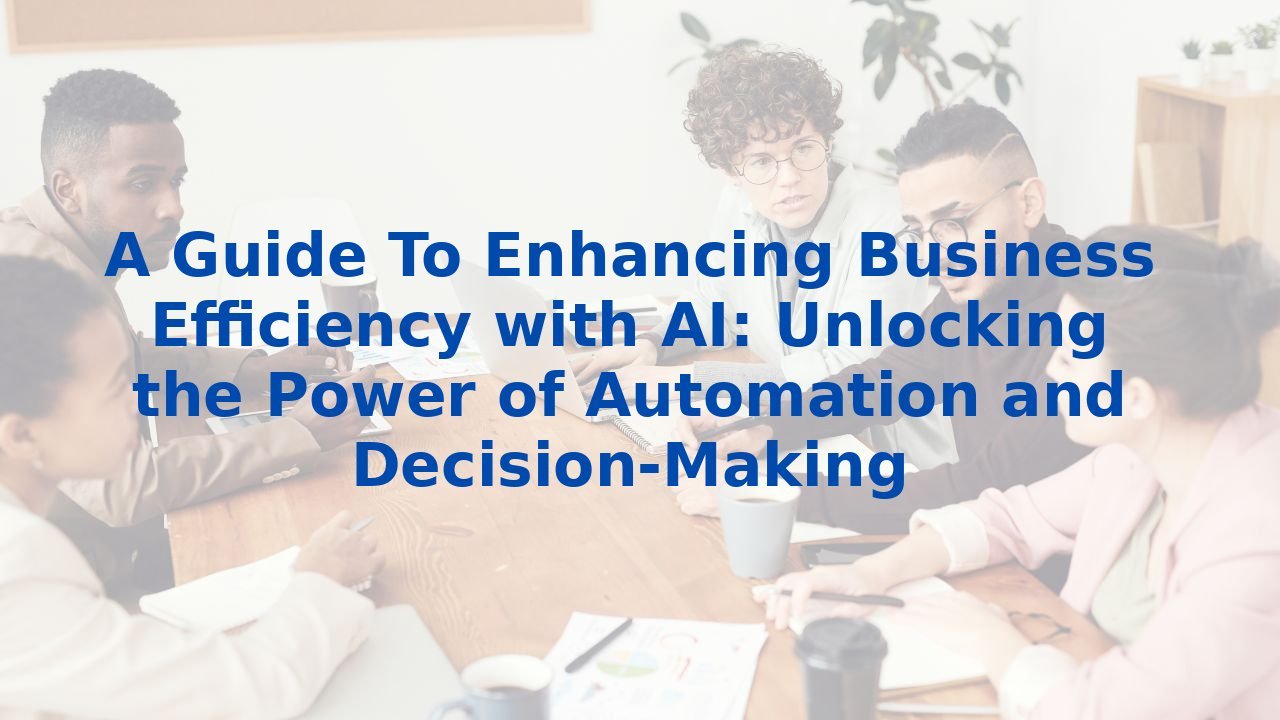A Guide To Enhancing Business Efficiency with AI: Unlocking the Power of Automation and Decision-Making
A Guide To Enhancing Business Efficiency with AI: Unlocking the Power of Automation and Decision-Making
In an era where time is more precious than gold, organizations are constantly searching for ways to redefine efficiency. Enter Artificial Intelligence (AI)—an innovative force that holds the key to unlocking unparalleled productivity and operational effectiveness. From automating mundane tasks to offering data-driven insights, AI is revolutionizing how businesses operate and compete.
Understanding AI Process Optimization
At its core, AI process optimization leverages advanced technologies to refine business processes dramatically. This isn't just about automation; it’s about utilizing machine learning to analyze data and enhance decision-making. The objective? To cut down errors, skyrocket productivity, and streamline operations.
The Profound Benefits of AI in Business
When we talk about enhancing operational efficiency, the benefits of integrating AI into business processes are incredibly compelling:
“Efficiency in business processes isn’t just desirable; it’s essential.”
1. Automating Routine Tasks
One of the most immediate impacts of AI is its ability to automate repetitive tasks. Imagine your team is swamped with document processing; AI can tackle high-volume tasks like these, allowing employees to focus on strategic initiatives that drive growth. It transforms mundane work into actionable data with intelligent document processing, streamlining workflows.
2. Enhancing Decision Making
AI acts as a powerful decision-support tool. By identifying patterns in vast data sets, AI can provide predictive analytics that enables business analysts to model scenarios, effectively determining the potential impact of various strategic choices. This empowers organizations to price products optimally without sacrificing profits or customer satisfaction.
3. Revolutionizing Customer Service
With AI in place, businesses can gain invaluable insights from customer interactions. By analyzing customer feedback and requests, AI can identify improvement opportunities, ensuring that customers receive prompt, effective solutions tailored to their needs.
4. Supporting Complex Decisions
In situations where decisions carry significant weight, AI shines. It simulates various scenarios and aggregates extensive data—both structured and unstructured—to present a clearer picture of potential outcomes. This enables organizations to make data-backed decisions that align with their strategic goals.
5. Real-Time Monitoring and Continuous Improvement
AI-driven process mining provides organizations with real-time insights, allowing them to detect anomalies and inefficiencies. This proactive approach means businesses can swiftly address issues before they escalate, ensuring continuous optimization of their processes.
Practical Applications of AI in Various Business Domains
“AI isn’t merely a tool; it’s a catalyst for transformation.”
1. Supply Chain Management
AI's real-time analysis capabilities are game-changing in supply chain management. By spotting anomalies in purchasing data, organizations can react swiftly to prevent shortages or delays—effectively safeguarding their operations.
2. Sales and Marketing
Imagine a sales team where administrative tasks are minimized. AI streamlines lead prioritization, recommends effective sales channels, and reveals upsell opportunities, enabling sales professionals to focus on high-impact activities—maximizing their productivity.
3. Human Resources
A well-functioning HR department is vital to any business. AI enhances HR processes by providing data-driven insights into employee performance and market trends, ensuring competitive and equitable management practices.
4. Product Development
AI accelerates product development through generative design, exploring every feasible option to meet specific requirements. This minimizes wasted time and resources on prototypes that may not hit the mark.
The Critical Role of Training in AI Implementation
While harnessing the power of AI poses exciting opportunities, the successful adoption of these technologies hinges on employee training. Here’s why:
1. Enhanced Understanding
Training equips your workforce with the knowledge needed to integrate AI into their daily tasks efficiently. This not only amplifies the benefits of AI but also encourages a culture of innovation.
2. Improved Efficiency
When employees are well-versed in AI functionalities, they can utilize these tools more effectively, reducing the likelihood of errors and boosting overall productivity.
3. Informed Decision Making
Employees who understand AI insights are empowered to make better strategic decisions, ultimately steering the organization toward success.
4. Agility and Adaptability
The business landscape is ever-evolving. A trained workforce is more adaptable, swiftly adjusting to new processes and technologies.
Conclusion
The integration of AI is no longer an option; it’s a necessity in today’s competitive market. Through a potent combination of automation, enhanced decision-making, and real-time process analysis, AI fundamentally transforms operational efficiency. By investing in employee training and embracing AI-driven innovations, organizations can set themselves up for substantial gains in productivity and competitive advantage. Let’s turn the key to unlocking this potential and lead your business into an era of efficiency and success.



